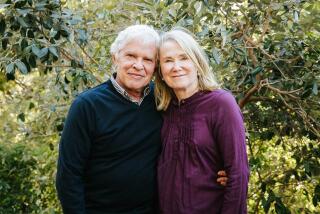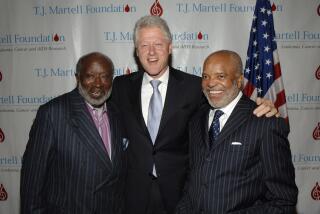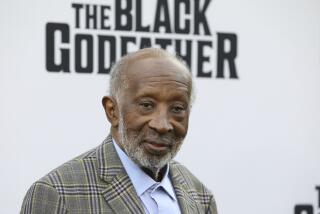Ernest W. Lefever dies at 89; founded conservative public policy organization
Ernest W. Lefever, who founded a conservative public policy organization in Washington, D.C., and was an embattled nominee for a State Department human rights job under President Reagan, died Wednesday at a Church of the Brethren nursing home in New Oxford, Pa. He was 89 and had Lewy body dementia, a progressive brain disorder.
Lefever, a resident of Chevy Chase, Md., was an international affairs specialist with the National Council of Churches, a staff consultant on foreign affairs to then-Sen. Hubert H. Humphrey (D-Minn.) and a senior researcher at the Brookings Institution before starting the Ethics and Public Policy Center in 1976. The center studies the link between Judeo-Christian morality and national and foreign policy.
In 1981, Reagan nominated Lefever for the State Department position of assistant secretary of human rights. After months of accusations concerning conflicts of interest involving his organization and controversy about his views of the human rights job, Lefever withdrew his bid after rejection by the Senate Foreign Relations Committee.
What drew the most media attention during his nomination was his distinction between “authoritarian” regimes that supported U.S. policy -- right-wing juntas, for example -- and “totalitarian” regimes run by communists who saw the United States as a foe.
Authoritarian states, he said, could be accorded “quiet diplomacy” to effect change, but totalitarian countries were diplomatically untenable.
“Our friends deserve quiet support and public encouragement in their quest for a more humane society,” Lefever wrote at the time. “We must earn this respect by being a steadfast ally rather than an erratic and capricious partner given to moral posturing.
“We should be concerned more with results than with rhetoric,” he added, “more with doing good than with feeling good. Getting one innocent man out of prison is worth more than a dozen noisy and ineffectual TV demonstrations.”
Many critics said Lefever’s distinction between authoritarian and totalitarian regimes was arbitrary. Among his opponents were his two younger brothers, Donald and John. Donald Lefever, a department manager for a Minneapolis farm cooperative, told the Foreign Relations Committee that both types of autocratic societies repressed human rights and that his brother was not the man for the job.
The presence at the hearings of Jacobo Timerman, a prominent journalist who was tortured by the military regime in Argentina, was said to have been a factor in the Senate committee’s rejection of Lefever.
There were also allegations that Lefever’s organization had a quid pro quo arrangement with Nestle, the Swiss food company that controversially marketed its baby milk formula to developing countries.
Nestle had given Lefever’s center $25,000 as the think tank sponsored a study into the medical needs of developing countries. The study was never written up, but the author, a reporter at Fortune magazine, wrote an article heavily favoring the company’s perspective. Lefever’s center reprinted the article.
The human rights post went to State Department official Elliott Abrams, who later that decade pleaded guilty to withholding information from Congress during hearings into the Iran-Contra scandal. Abrams was pardoned by President George H.W. Bush for his role in the scandal in which U.S. officials covertly sold arms to Iran to win the release of U.S. hostages in the Middle East and used some of the profits to support Nicaraguan rebels known as the Contras.
Ernest Warren Lefever was born Nov. 12, 1919, into what he called a “pious, religious, pacifist family” in York, Pa. He became an ordained minister in the Church of the Brethren, a Christian denomination that grew out of Germany in the 18th century and, like Quakers and Mennonites, emphasizes Christian pacifism.
He was a 1942 graduate of Elizabethtown College in Pennsylvania and a 1945 graduate of Yale Divinity School. In 1956, he received a doctorate in Christian ethics at Yale.
In 1951, he married Margaret Briggs. She survives, along with two sons, David Lefever of New Rochelle, N.Y., and Navy Capt. Bryce Lefever of Norfolk, Va.; his brother John, of Lancaster, Pa.; and four grandchildren.
Lefever disavowed his early belief in pacifism after traveling to Europe after World War II. In his 1998 book, “The Irony of Virtue,” he wrote about seeing “scattered rib bones in the red clay” at Bergen-Belsen concentration camp in Germany. In subsequent lectures, he showed audiences a bone he had taken from the camp, a tangible reminder of mankind’s potential for evil.
From his visit to Bergen-Belsen forward, he called himself a “humane realist.”
His wife, Margaret, said that “there was a certain repair” among Lefever and his younger brothers in the years after her husband’s nomination for the State Department job.
--
Bernstein writes for the Washington Post.
More to Read
Sign up for Essential California
The most important California stories and recommendations in your inbox every morning.
You may occasionally receive promotional content from the Los Angeles Times.










